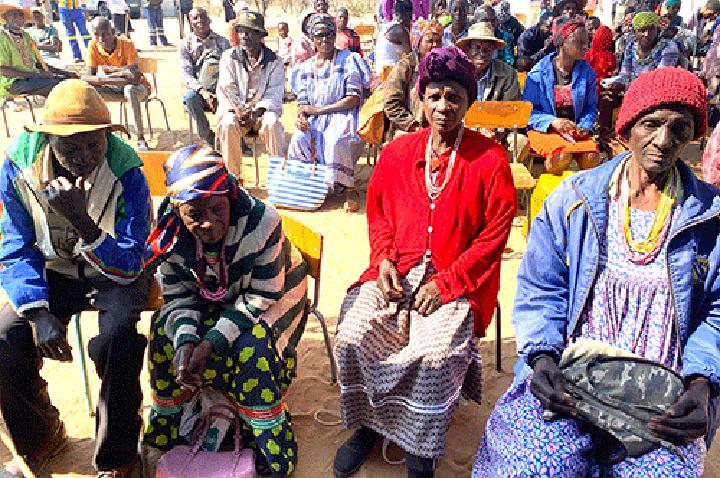Africa-Press – Namibia. Dual citizenship and statelessness have emerged as contentious issues among residents of Choi and Kongola.
They raised serious concerns over national identity, legal status and access to government benefits.
Community members voiced frustration on Monday during a civil-military cooperation sensitisation campaign underway in the Zambezi region. They called on authorities to clarify how such cases are handled.
The Namibian Defence Force and the Botswana Defence Force, in collaboration with other government offices, ministries, agencies and stakeholders, are conducting Phase Two of the joint sensitisation in both countries. Jeffrey Bede, a concerned resident of Choi, questioned the legitimacy of individuals who claim Namibian identity despite holding foreign documents. Bede asked how people end up with dual citizenship.
“For example, those people who have stayed in Namibia for years and years, the court can say this person can have a Namibian identity (ID). But when they go there [to apply], do they surrender their old IDs from different countries or what?” he questioned.
Addressing the issue, Zambezi police spokesperson Kisco Sitali shed light on how some individuals manipulate the system by feigning statelessness. “They do not belong to any country – that’s what they claim. But in fact, they know they have an ID for Zambia or Angola in their pockets or briefcases,” Sitali said.
He added: “But when they are here in Namibia, they’ve been here for so long. They do not advance the documents of the countries where they came from. They just say, ‘I don’t even know where I came from”. Sitali said this concealment creates a legal dilemma for immigration authorities and the courts. When individuals are found to have lived in Namibia for years – sometimes even marrying and starting families – the court may step in to assist with documentation, mistakenly assuming the person is truly stateless.
“Later on, it’s only discovered that this person was not stateless. It was someone who had documents from where he came from but hid those documents,” he stated.
He cited instances where individuals who benefitted from Namibian pension schemes retired and returned to their country of origin – only to continue collecting their pensions from both nations. “We’ve seen people retiring and going back to their country of origin after getting their benefits here. Every month end, like the pension, they come here, collect and go back. And they are also collecting a pension on the other side,” Sitali added.
Status
Back in 2021, Cabinet directed the home affairs ministry to address the issue of undocumented and stateless persons in the country.
Although the ministry ambitiously set sights on realising this target and resolving the problem, eradicating statelessness within the set timeframe is a mirage, the ministry conceded.
The executive director of the ministry, Etienne Maritz, told New Era last year that ending statelessness is a mammoth task.
Stateless people are those who do not have citizenship in any country, while undocumented people lack legal documentation to prove their identity and citizenship. “It is a journey that has various steps. The Harambee Prosperity Plan (HHP II) has detailed the implementation plan under the social progression pillar. We are operating under that plan to realise the dream,” he said at the time.
The United Nations High Commissioner for Refugees (UNHCR) states that both groups (stateless and undocumented), often belonging to the minority in society, are deprived of human rights and access to basic services. This leaves them “politically and economically marginalised and vulnerable to discrimination, exploitation and abuse”. Currently, Namibia does not have a law that recognises this demographic.
The UNHCR said at least 4.4 million people in 95 countries are stateless.
The actual figure globally is believed to be significantly higher, given the relative invisibility of stateless people in national statistical exercises.
Here, a total of 141 048 people registered themselves with local authority offices countrywide as being stateless or undocumented. However, the ministry said these specific figures are not validated. Since the commencement of the national mass registration process in March 2024, the ministry has registered 2 607 stateless or undocumented persons. The recent figure from the ministry indicates the Zambezi region leads the pack with 589. They were followed by Khomas with 578, Erongo with 321, Hardap with 237, Kavango East with 188, Kunene with 169, Otjozondjupa with 154, Ohangwena with 126, Omusati with 90 and Oshikoto with 58.
At the time, Kavango West, Kharas, Omaheke and Oshana had 36, 30, 27 and four people, respectively.
Through a nationwide mass registration campaign conducted between February and July 2024, the immigration ministry successfully issued 110 620 national documents and identified 14 976 undocumented or stateless persons.
For More News And Analysis About Namibia Follow Africa-Press






